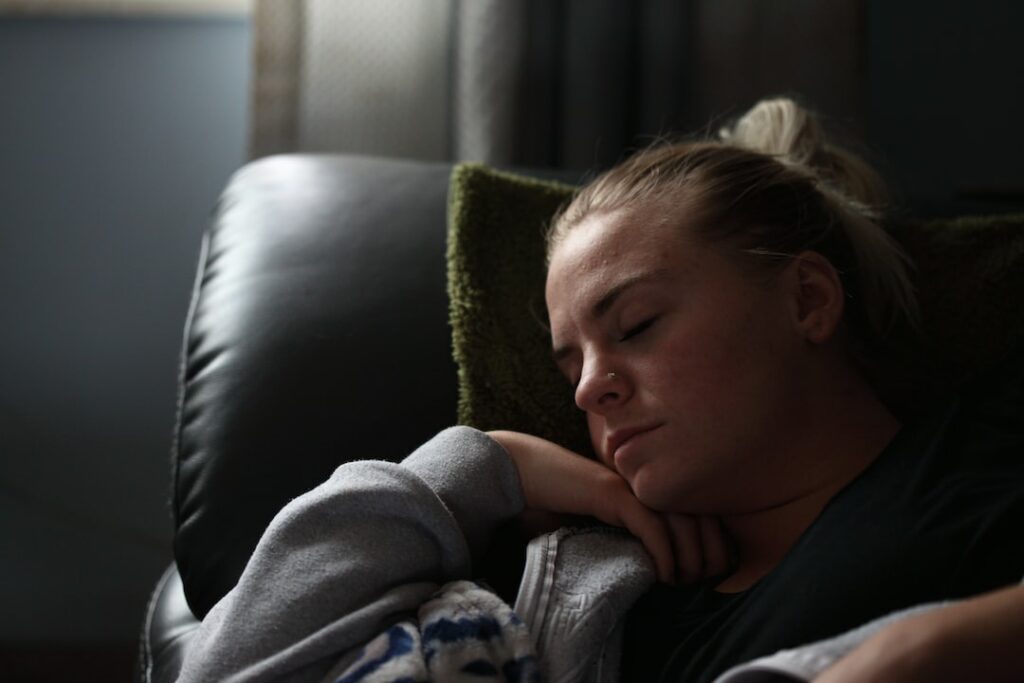


Have you ever wondered why alcohol makes you tired and so sleepy? Well, in this article, we’ll explore the intriguing effects of alcohol on quality sleep and unveil the reasons behind that drowsy sensation.
Stay tuned to discover the science behind this phenomenon and how it affects your sleep patterns.
Alcohol’s depressant effect on the central nervous system can contribute to feelings of sleepiness and relaxation. When you consume alcohol, it acts as a sedative, slowing down the firing of neurons in your brain. This sedative effect is why alcohol makes you sleepy.
However, it’s important to note that the sedative effect of alcohol only lasts for the first part of the night. As you metabolize alcohol, it actually has the opposite effect, disrupting your deep sleep and reducing its quality and quantity. Alcohol can lead to fragmented sleep, frequent waking, and a decrease in REM sleep, which is the deepest stage of sleep. This can result in grogginess, a higher risk of disease, and even early death.
Additionally, the negative effects of alcohol can interfere with your circadian rhythm, causing you to wake up more often throughout the night. So, while alcohol may initially make you feel sleepy and tired, it ultimately has a negative impact on your sleep.
When you consume alcohol, it has a biphasic effect on your arousal and sleep, first causing arousal and then making you feel sleepy.
Initially, alcohol acts as a stimulant, leading to increased arousal and a feeling of alertness. This is due to its sedative effects on the central nervous system.
However, as alcohol levels in your body decrease, it transitions into a sedative, making you feel drowsy and facilitating sleep.
It’s important to note that while alcohol may initially help you fall asleep faster, it disrupts the quality and quantity of your sleep. It can lead to fragmented sleep, frequent waking, and reduced REM sleep, which is essential for restorative rest.
While alcohol may make you feel sleepy initially, its negative effects on sleep should be considered.
Drinking alcohol can lead to disruptions in the amount, duration, and consistency of REM sleep. REM sleep is the most restful and restorative stage of sleep, and alcohol can interfere with it. Let’s take a closer look at how alcohol affects REM sleep:
| Alcohol’s Impact on REM Sleep | Description |
| Decreased REM Sleep | Alcohol can lead to a reduction in the amount of REM sleep you get during the night. This can result in less restorative sleep and may leave you feeling groggy and tired the next day. |
| Fragmented REM Sleep | Alcohol can cause fragmented REM sleep, meaning that you may experience frequent awakenings throughout the night. This can disrupt the natural sleep cycle and prevent you from getting a good night’s rest. |
| Circadian Rhythm Dysfunction | Alcohol can interfere with your circadian rhythm, which is your body’s internal clock that regulates sleep-wake cycles. This can lead to difficulties falling asleep, frequent waking during the night, and a disrupted sleep schedule. |
Sleep disorders and alcohol consumption are closely intertwined, causing disruptions in your sleep patterns and impacting the overall hours of sleep you get.
People who consume alcohol can experience various sleep disorders, such as insomnia, hypersomnia, and sleep latency. One common sleep disorder associated with alcohol is sleep apnea, where breathing repeatedly stops and starts during sleep. Alcohol can relax the muscles in the throat, leading to a higher risk of airway collapse and obstructed breathing.
Additionally, alcohol’s relationship with sleep disorders is bidirectional. People with sleep disorders may be more likely to consume alcohol to help them sleep.
It’s important to recognize that while moderate amounts of alcohol may initially make you feel tired, it can ultimately cause sleep disruptions and contribute to the development or worsening of sleep disorders.

To understand the potential risks associated with alcohol and sleep, it’s important to consider the observations of how alcohol affects your sleep patterns. Here are some key observations and risks to keep in mind:
It’s important to prioritize healthy sleep habits and consider the potential risks of alcohol on your sleep quality.
The sedative effect of alcohol makes it a perfect and easily accessible sleep aid. Drinking a glass of wine before sleep may quickly turn into a habit, which can develop further into substance addiction.
When it comes to overcoming addiction and improving your sleep, it’s important to consider a comprehensive approach that focuses on your physical, mental, and emotional health.
Using alcohol can have a detrimental effect on your sleep cycle. While it may initially make you feel sleepy and relaxed, it actually disrupts normal sleep patterns and can lead to poor sleep quality. To sleep better, it’s important to avoid alcohol before bedtime.
A holistic treatment approach involves individualized treatment plans that cater to your unique needs. It includes addressing underlying issues, providing support for long-term recovery, and offering resources to help you maintain sobriety. By taking a holistic approach to addiction treatment, you can get a good night’s sleep and improve your overall quality of life.

If you’re experiencing both alcohol addiction and sleep disorders, a dual-diagnosis treatment is available to address both issues simultaneously. Dual diagnosis treatment recognizes that alcohol use disorder and sleep disorders often coexist and can have a significant impact on each other.
This type of treatment takes into account the unique challenges and complexities that come with addressing both conditions at the same time.
Dual diagnosis treatment for alcohol and sleep disorders typically involves a comprehensive assessment to determine the specific sleep disorder and the severity of the alcohol use disorder. From there, an individualized treatment plan is developed, which may include a combination of therapies such as cognitive-behavioral therapy, medication management, and sleep hygiene education.
In conclusion, alcohol has a complex effect on sleep. Initially, it causes arousal before eventually leading to sleepiness. This is because alcohol slows down neuronal activity in the central nervous system, resulting in relaxation and fatigue. However, it is important to note that alcohol can also disrupt REM sleep, which is essential for restoration. This disruption can lead to various sleep disorders.
Understanding the impact of alcohol on sleep is crucial for maintaining healthy sleep patterns. It is recommended to seek individualized treatment plans that address both alcohol use and sleep disorders. Taking a holistic approach to recovery can significantly improve overall well-being.
Chakravorty, S., Chaudhary, N. S., & Brower, K. J. (2016). Alcohol Dependence and Its Relationship With Insomnia and Other Sleep Disorders. Alcoholism, clinical and experimental research, 40(11), 2271–2282. https://doi.org/10.1111/acer.13217
Pacheco, D. (2024) Alcohol and Sleep [online]. Available at: https://www.sleepfoundation.org/nutrition/alcohol-and-sleep#:~:text=Alcohol+is+a+central+nervous,poor+sleep+quality+and+duration.